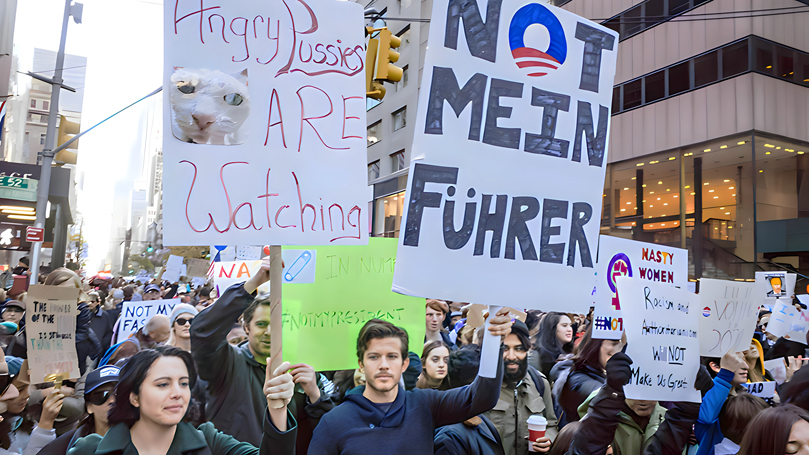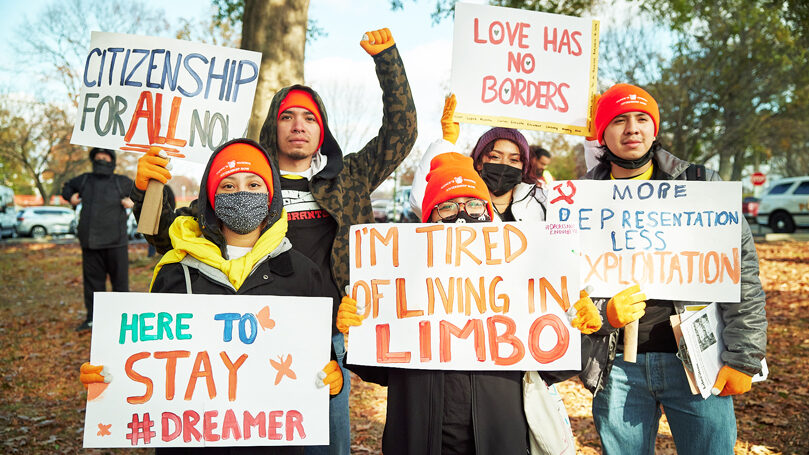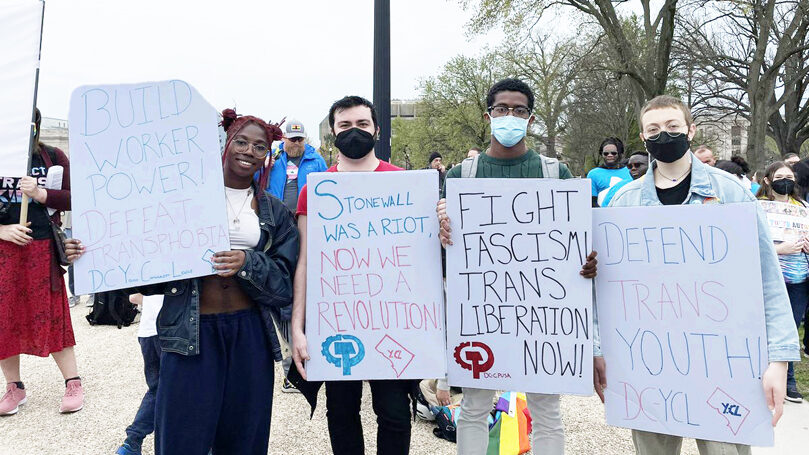
The U.S. is, without a doubt, at a dangerous crossroads. U.S. global dominance is waning as country after country rushes to leave the dollar, join the BRICS initiative, resist pressure to side with U.S. imperialism’s goals in Eastern Europe, or turn to China for trade and empowerment. As the U.S. pours vast amounts of its treasury into weapons of war, its national debt is approaching 150% of its GDP. Because the U.S. dollar is a primary basis of international trade and debt, U.S. capitalists can delay a major breakdown of the system by gambling on the future productivity of labor in this country and in others. Simply put, the structure of U.S. imperialism protects the U.S. from economic collapse even in conditions that would force any other country in the world to default.
That protection may be rapidly vanishing.
Criminal U.S. military blunders and misadventures — in Afghanistan and Iraq, for example, not to mention the massive waste of life and treasure in Ukraine — have failed to achieve the imperialist dream of a “New American Century.” Rather than entering an era of unchallenged global dominance, the U.S. is facing deteriorating economic hegemony.
Behind the events, we can think of imperialism as the international dimension of monopoly capitalism, which also characterizes its internal domestic policies. Both sides are edging toward catastrophe.
This is the longer-term international context for the internal political crisis. When the small-minded, anti-humanist, despot-wannabe Donald Trump secured the presidency with a minority of popular votes in 2016, the conditions were ripe for an infestation of fascist policies and organizations to rise to prominence. His immediate actions to elevate fascist movements created new levels of turmoil, confusion, and violence. His personal corruption as president continues to reverberate today, promising another round of political conflict that could erupt into more violent confrontations on the part of his supporters.
But Donald Trump’s fascism and corruption have spread like a virus across the country. Inspired by his bigotries, xenophobia, hatred of women, anti-Black poison, brutal policies targeting non-white immigrants, his war on education and science, and his general mockery of the value of human life, fascists have gained prominence in local and state Republican Parties across the country. Fueled by a growing right-wing media storm against democracy, racial equality, gender equality, the rights of workers to organize unions, and international peace, this movement has congealed into a variety of hysterical, hostile clusters now controlling state governments like Florida’s ruling Republican Party.
Using a slogan to “make America like Florida,” Ron DeSantis has turned that state’s government into a den of anger and hostility toward anti-racism or gender equality and worker organizations. To promote more anger at immigrants and the slightly less xenophobic immigration policies of Democrats, DeSantis created a state policy of kidnapping and trafficking immigrants and asylum seekers detained by state authorities to New York, Sacramento, and Chicago to show his followers how brutal he can actually be. His actions signal how the Republican Party’s contest for the presidency rests on a competition to see who can be the most inhumane, the most fascistic. Texas Governor Greg Abbott copied DeSantis’s efforts, causing many human rights activists to accuse him of illegal trafficking.

Although in each of those places, immigrants’ rights activists tried their best to welcome and support the victims of DeSantis’ trafficking policy, the trauma of his actions, an intended consequence, remains. Notably, the U.S. is a signatory to international conventions that protect the rights of asylum seekers, meaning that not only has DeSantis likely violated U.S. law but also international law.
DeSantis’ hatred of immigrants is perhaps only surpassed by his revulsion for gender equality and transgender people. He signed into law a record number of anti-LGBTQ laws that encourage discrimination and especially target transgender people for special abuse. His policies require state educational institutions to stop teaching about sexual orientation or gender identity as part of its “sex education” curriculum. Once comprehensively scientific, those classes now are required to “not say gay.” Despite the likely unconstitutionality of the laws, and the widespread protest they prompted among students, teachers, and communities, the law remains a source of pride for the presidential contender as he prepares to boast accomplishments of hate and violence toward a community his party’s base generally abhors.
In addition to these education policies, DeSantis signed a bill that interferes in the private medical decisions of families and individuals by outlawing access to gender-affirming medical care for transgender youth. He believes that by punishing youth who do not identify with the gender they were assigned at birth, he can win enough votes to become president. Again, this pattern of hatred has been repeated in Texas and South Dakota. The fabrication of panic over transgender people, legal experts and medical activists say, will promote irreparable harm against transgender youth, who already suffer extensive abuse from unsympathetic parents and religious leaders, and who also experience the highest levels of unemployment and homelessness, and who are frequently targeted with violence.
Panics over immigration, gender identity, and anti-racist ideas have also been expressed in a wave of book bans across the country.
The anti-Black racism of Republican contenders and its political base also deepened during the Trump era. Notoriously, the former president invoked threats against anti-racist protesters during the 2020 uprising against racist police murders of Black people. He elevated the racist organizations and supported racist vigilantes. Since then, racist vigilantes who have shot and attacked Black people like the lynchers of old, have been emboldened. When Daniel Penny was finally arrested and charged with killing Jordan Neely in a New York subway, a brutal killing that was captured on a cellphone video, Ron DeSantis called him a “good Samaritan.” A host of fascist media personalities chimed in, competing to see who could support Penny the loudest, and denouncing Neely, as if his life didn’t matter. A Christian fund-raising site helped provide more than a million dollars toward Penny’s legal defense.
In addition to their relentless support for violence against Black people, Republican politicians consistently advocate voter suppression policies that target Black voters.
Panic over gender identity, fear and hatred of non-white asylum seekers and immigrants, and anti-Black racism have emerged as central planks in the Republican Party’s platform. This radical shift away from its previous attempts to code racism with other kinds of rhetoric (like “welfare queens” or drug users) reveals something deeper about conditions in the U.S. as a whole.

Most people in the U.S. reject the overt hatred. Despite extreme-right, red baiting efforts to make a boogeyman out of “wokeness,” the majority of U.S. people continue to view the term as meaning being informed and aware of social injustices. And Donald Trump never received a majority of votes, highlighting a fundamental flaw in the U.S. political system — that a person could gain so much power without majority support.
Still, the Republican Party’s turn toward fascism is not simply a symptom of the impact of Trump. It reflects the larger calamity the U.S. faces in the world system. U.S. imperialism has always depended specifically and decisively on a false belief in Euro-American racial superiority; the “American exceptionalism” which regards the U.S. as superior to countries with non-white majorities cannot be separated from the racial and national oppression taking place within its own borders. The Republican Party’s turn to fascism is a symptom of the looming predicament of white supremacy linked to a larger decline in U.S. power globally. Fascists believe that whipping up panic, fear, and hate can help them win domestic power and translate that culture of anger and hate into a militarized foreign policy of reckless warmongering.
Following the long-time pattern of U.S. politics, which is thoroughly corrupted by corporate dominance and the cash of billionaire donors who benefit from hard-right policies (especially anti-union policies), leading forces within the Democratic Party consistently tail this turn to the right, even as its most progressive sections try to resist. Biden’s mass deportation of Haitian asylum seekers, even as the U.S. intervenes in Haiti’s internal politics, is but one example of that structural “tailing” practice.
Democratic Party compromises with the right, especially over the manufactured “default” threat, will harm many tens of thousands of workers. And Biden’s pretense that his “hands were tied” by the system is a long-time practice of surrendering workers’ needs to billionaire profits. The continued pouring of resources into the police and military — to create “cop city” in Atlanta, for example, or to inject $1.2 trillion each year into the war industry, or to establish minimum budget requirements for cops in Grand Rapids — fits into the larger picture of succumbing to right-wing pressure. Apparently, many Democratic Party politicians are more afraid of the police foundations and their fascistic supporters than they are of our U.S. working class and people. In this regard, changing their calculus will require a much larger, more active and united mass movement.
This crisis we face, as dangerous as it has become for democracy, workers, and peace, also reveals opportunities for how we, as the U.S. people and working-class, can struggle past it.
The best response, beyond a nuanced policy of supporting the most progressive policies and movements in each situation (like a city election, a regional struggle for resources, strike activity, clean water, or statewide referendum to protect abortion rights), is organization, organization, and organization. But that is only a starting point. Our theory of struggle unites the democratic and workplace struggles, highlights the fascist threat, and advances peace and international solidarity among the world’s workers and oppressed people: Solidarity with Cuba and with our transgender siblings. The fight for unions at Starbucks, Chipotle, Amazon, and universities. Community control of the cops. Peace in Ukraine and freedom for the Taiwan province from U.S. meddling, together with a defense of Peru’s people against a U.S.-backed coup. Clean water in Michigan and clean air in New York, along with our right to read the books that inspire our imaginations. We still have a world to win, and nothing to lose but our chains.
Images: March against Trump, New York City by mathiaswasik (CC BY 2.0); We need protection for #DACA recipients and #CitizenshipNow by National Immigration Law Center (Twitter); DC YCL at Trans Day of Visibility march by People’s World (CC BY-NC 2.0)


 Join Now
Join Now